skip to main |
skip to sidebar
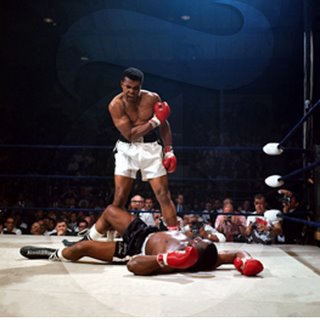 "I Shook Up the World...I'm a bad man", the young man from Louisville, Ky said. "I must be pretty", he yelled at the reporters and anyone else in the auditorium with his mouth wide open. "I'm only 22 years old, I fought Sonny Liston and I don't have a mark on my face!" He said amazed at the feat he had accomplished and the fact that he survived a clash with a titan. "I must be pretty! I'm a bad man!"And he had every reason to be scared of the man he had knocked out in the first round of their second fight.In his day, Sonny Liston was more feared than Mike Tyson and more trouble than George Foreman. He was built like a gladiator and his face looked like it was made to scowl. Thunder roared and lightning struck, on the rare occasions when he did manage to smile. It seemed like there was nothing in the world that could scare Sonny Liston. The one time heavyweight champ had been an ex-con and a known leg breaker for the Outfit (that's the Chicago arm of the Mob to you). He had more run-ins with the cops than DMX and probably served more time in prison than any two rappers you can name. He truly was a bad man.On the other hand his opponent Cassius Marcellus Clay Jr, was a talented light heavyweight, with lightning quick speed and an awkward boxing style. He did everything wrong: he kept his hands down low instead of in a defensive position and he ran - alot, a whole lot. But mostly reporters and fight fans didn't like him because he ran his mouth. A lot. A whole lot. They nicknamed him the "Louisville Lip". He was just a kid they felt that needed a good butt whuppin'. And Sonny Liston would be the right guy to do it.When they met for the second time in an auditorium in Lewiston, Maine (in a place that was normally an ice hockey rink) Clay, who had just changed his name to Muhammad Ali was not as scared as he was the first time they met. But he was nervous, for Liston was not a man to take lightly. One minute and some change into the fight, Ali hit Liston with a punch that very few ringside observers (or anyone else for that matter) saw. He called the punch 'the anchor punch' - which scientifically, isn't the greatest punch in the world. He learned it from the old black vaudeville performer Sambo. But nevertheless, it worked. When Liston caught that punch square on his jaw, BAM, to the canvas he went. And, into history they went as well. Ali is now acknowledged as one of the greatest fighters ever and Liston...one of the scariest opponents a man could face.
"I Shook Up the World...I'm a bad man", the young man from Louisville, Ky said. "I must be pretty", he yelled at the reporters and anyone else in the auditorium with his mouth wide open. "I'm only 22 years old, I fought Sonny Liston and I don't have a mark on my face!" He said amazed at the feat he had accomplished and the fact that he survived a clash with a titan. "I must be pretty! I'm a bad man!"And he had every reason to be scared of the man he had knocked out in the first round of their second fight.In his day, Sonny Liston was more feared than Mike Tyson and more trouble than George Foreman. He was built like a gladiator and his face looked like it was made to scowl. Thunder roared and lightning struck, on the rare occasions when he did manage to smile. It seemed like there was nothing in the world that could scare Sonny Liston. The one time heavyweight champ had been an ex-con and a known leg breaker for the Outfit (that's the Chicago arm of the Mob to you). He had more run-ins with the cops than DMX and probably served more time in prison than any two rappers you can name. He truly was a bad man.On the other hand his opponent Cassius Marcellus Clay Jr, was a talented light heavyweight, with lightning quick speed and an awkward boxing style. He did everything wrong: he kept his hands down low instead of in a defensive position and he ran - alot, a whole lot. But mostly reporters and fight fans didn't like him because he ran his mouth. A lot. A whole lot. They nicknamed him the "Louisville Lip". He was just a kid they felt that needed a good butt whuppin'. And Sonny Liston would be the right guy to do it.When they met for the second time in an auditorium in Lewiston, Maine (in a place that was normally an ice hockey rink) Clay, who had just changed his name to Muhammad Ali was not as scared as he was the first time they met. But he was nervous, for Liston was not a man to take lightly. One minute and some change into the fight, Ali hit Liston with a punch that very few ringside observers (or anyone else for that matter) saw. He called the punch 'the anchor punch' - which scientifically, isn't the greatest punch in the world. He learned it from the old black vaudeville performer Sambo. But nevertheless, it worked. When Liston caught that punch square on his jaw, BAM, to the canvas he went. And, into history they went as well. Ali is now acknowledged as one of the greatest fighters ever and Liston...one of the scariest opponents a man could face.
One of the first female MC's on the mic was from the Zulu Nation, her name was Queen Kenya. She rhymed on the mic in combination with Mr. Biggs and a guy by the name of Cowboy. According to Mr. Biggs, "It wasn't rappin like we know it now, but it was just little phrases."
But the old school chick who gets major props as being one of the first to do it - and do it extremely well is Sha Rock of the Funky Four Plus One More. Sha Rock had the voice and the rhymes.
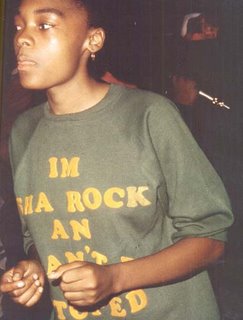
"See if the sun don't shine and the rain won't stop,
We got a style called punk rock,
Just get up the chairs and just have some fun,
Cause there's two deejays the Funky 4 Plus One.
To the people out there we want you to know,
We are the ones with the magic controll.
Cause theres two deejays and five MC's,
Four of the fellas plus one is me..."
The other stand outs from this period are Lisa Lee, Debbie Deb, Pebblee Poo and the Mercedes Ladies - big ups to DJ Flame b/k/a La Spank.
In 1984 the script got flipped as far as female MC's went when two chicks battled on wax: Roxanne Shante and Sparky D
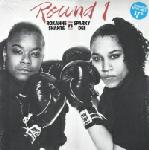
Roxanne had the punchlines but Sparky had the fire. She was strong and aggressive on the mic. Shante's voice was thin but her punchlines were damn funny.
In the late 80's and early 90's a new crop of female MC's hit the scene: Queen Latifah, Monie Love, Sweet Tee, MC Lyte and Antoinnette. Queen Latifah back in the days had the skillz - no doubt, she was top notch witness cuts: 'Wrath of My Madness and "Inside Out". She was raw. Monie Love - who is currently an on air radio personality in New York, was the another top rank contender.
But it was the fierce gangstress from Queens who was the real underdog here. Dubbed the "female Rakim" Antoinnette rhymed in a low monotone that insinuated a cold crushing death to her competition. First premiering on a Hurby Azor produced compilation her songs "I Got An Attitude" and "Hit Em Wit This" were official boom box classic material. But it was the classic 'Who's the Boss" that cemented her forever.
Unfortunately her career would go nowhere due to poor management advice. Somehow someway she got caught up in a lyrical war with MC Lyte, a Brooklynite whose actual technical rhyming skills could not match Antoinnette's, however her raw voice and punchlines made her a quality opponent. Lyte's manager and father told me himself that Antoinnette was actually better than Lyte.
http://youtube.com/watch?v=SX318Aa5X40&search=antoinette
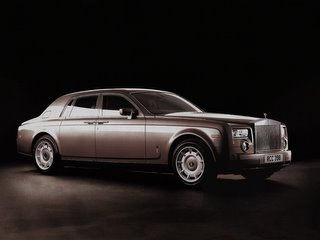
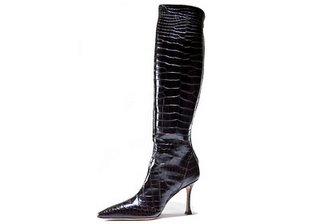
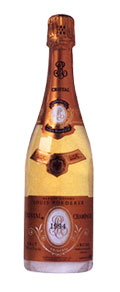 SOMETHING YOU CAN"T ...
SOMETHING YOU CAN"T ...CLASS
I'm always happy to see people go for their dreams, it's what separates us from the animals. The fact that we can dream, but more importantly work to achieve our dreams, is what makes us the higher species.With that said, I don't know about you, but why have we lowered expectations for our kids? Case in point here's something from AllHipHop.Com:“[V-103’s] Ryan Cameron will host a live remote from there along with Greg Street. It’s important that we let the ‘hood know that we know where we come from.”Block will also be giving away prizes such as studio time and the opportunity to record a demo. The block parties are being put on as part of a community initiative of Block Enterprises’ Turning Pennies to Dollaz Foundation. "It seems like every other event I go to somebody is either giving away studio time or telling folks how they can get a deal. What's wrong with this picture?If you know anything about the music industry you know one thing: Very few artists get rich selling records. I am not going to go into the mechanics behind getting a record played and all that but I will say this...it is hard to truly make money in the record business. No one talks about life after you stop selling records (should you ever sell a substantial amount), no one talks about the need for you to have some other skills besides rap, singing, beatmaking, deejaying, remixing and so forth and so on; without a marketable skill outside of the music industry you can find yourself at 35 flat broke and busted with very few options left in a still young life.
The Real Reason Real Hip Hop Doesn't SellBefore digital downloads and mixtape exclusives, eager hip hop fans sat by their boom boxes with blank cassette tapes set to "pause" and "record", so that they could record the newest jams to hit the streets. Mind you it costed nothing to record songs off of the radio, except for the cost of the tape. At that time the best MC's and DJ's of the 80's and 90's could be heard on late night mix shows on radio stations all throughout the country. Name a group...The Juice Crew - played on WBLS, WBAU, KZSU, KPOO, KDAY and many other stations; Main Source - same thing. The records were played everywhere, except there was one problem: People didn't buy the records because they taped them off of the radio.At the same time the gangsta movement was rearing its head. These guys were selling records without radio play. In fact, they were selling more records than the guys who were getting some serious spins. Why was that? It was because their fans talked with their dollars rather than their voices. Soon the major corporations caught onto the buzz. The rule of business is: Go with what sells. Real hip hop (as we like to call it) didn't have the numbers that the gangsta's were getting. Do you see where I'm going with this?If ya like real hip hop (and I know you do) you gotta support it. If you don't like Source Magazine that's fine. Buy Wax Poetics or Elemental. If you don't like your local radio station tune into Spinderella's 'Back Spin' or Davey D's "Breakdown FM". But for God's sake man, spend your money so that the people who make the kind of stuff we like can continue to bring it to us.Recently the head of Cristal Champagne said that the attention that hip hoppers have given his beverage is 'unwelcomed'. Jay Z, one of the people who has long championed that brand is leading a boycott against them. What's wrong with this picture?Let's start with this, Cristal is some of the MOST expensive stuff out there. I remember one night my cousin Gian and I were at a bar and G turned to me and said, "Yo cuz, let's get a couple of glasses of Cristal." Out of curiousity, I asked the bartender how much a glass of Cristal was, to which she responded $75.My mouth hit the bar top. 75 dollars? I asked."Yes", she said.'For one glass?""Yes"."Get da fuck outta here!"Now Jay, Diddy, Russell Simmons, Dame Dash and many others have been walking around name checking that crap everywhere they have gone for years. It is only fitting that those gentlemen lead the boycott. What the head of Cristal did was the equivalent of a pimp slap. SMACK! Bitch where's my fuckin' trap?(Pick any of the previously mentioned names) "Oh no daddy, I'm sorry I won't hold out no mo."At industry events you would see those types walking around the party sipping Cristal out of the bottle with a straw. Yep, you sure would. Now look someone has said to them: "Get you and nigger friends and your nonsense and leave my company alone. Gone now. Shoo, you you you you porch monkies. Oh yeah, leave your money on the table. Got dam nigger."He might as well have said all that when he made that statement. It's the power of the dollar that will make that company get on its knees and beg for forgiveness. The same kind of thing is happening right now in radio. The foolishness of the few has harmed the perception of the many. Meaning advertisers (fuck what ya heard about requests and all that the real Gods of radio are the ADVERTISERS) are backing away from certain Urban brands; namely hip hop radio. It is not working. Low ratings means low listenership equalling no interest but ultimately no advertising dollars. Thus, stations like KKBT having to change formats!The winds of change are upon us, if you want real hip hop to come back - buy it.
 DJ HOLLYWOOD: STRAIGHT NO CHASERby Mark SkillzEvery musical genre has its folk hero. In the tradition of the Delta blues men, it is said that the great Robert Johnson made a deal with the devil to give him the power to be the best blues man ever. In the early days of the rap scene, there was one name that was constantly evoked as the prime creator of the new sound of the street called rap, and that name was D.J. Hollywood.
DJ HOLLYWOOD: STRAIGHT NO CHASERby Mark SkillzEvery musical genre has its folk hero. In the tradition of the Delta blues men, it is said that the great Robert Johnson made a deal with the devil to give him the power to be the best blues man ever. In the early days of the rap scene, there was one name that was constantly evoked as the prime creator of the new sound of the street called rap, and that name was D.J. Hollywood.
For party-going New Yorkers in the '70's there were certain spots you had to hit, like The Loft, Paradise Garage, Justine's, and Zanzibar's. But for those that wanted to party in Harlem and the Bronx there were places like Charles Gallery, the Hotel Diplomat, Smalls Paradise, and Club 371. If you frequented places like these, you know doubt came upon a young man with crates of records and a golden voice.Today at 50 years old, the original rhyme king is still doing his thing; he was recently honored on VH1's: "Hip Hop Honors Show". On his latest mixtape he will be spinning house and reggae as well as classics."I first made my name in Harlem because of a dance called the "Bus Stop"; I could "Bus Stop" and I could "Hustle". I was nasty at it. I wasn't Puerto Rican nasty at it- but I was good at it. I was making moves - looking good- I was really good at it. Every party I would go to people would say, "Let me see you Bus Stop! Before that, I had a rep as an entertainer; everything I did back then was theatrical. That's how I got the name Hollywood.I was 14 years old when I left home, my mother and I just didn't see eye to eye. She had a lot of rules. My drive to go to school wasn't there. I wanted to breathe. I used to see the hustlers man, and I would just marvel at the hustlers. That was the world I wanted to be in. I lived in the after hours clubs around Harlem. It was a whole lot of fun back then too. What they use to do in these places was: they'd cover the windows with big dark sheets, so that it would be dark as hell in there. I mean it was completely dark. You could go in there at night and not leave until like 3 o'clock in the afternoon the next day. Hustlers used to be in there playing cards, getting' high, drinking - whatever…it was an after hours spot.I used to run errands for them, at 8 o'clock in the morning everybody in the spot would give me their keys to move their cars, they'd be like, "Here kid, go get me some cigarettes, and while you're at it, here's my keys go move my car." I was moving and parking Cadillac's at 14 years old.When I was 14, maybe 15 years old, I went to a spot on 167th and Amsterdam where this guy named W.T. used to play at. He was my first real inspiration to be a deejay. He had the two turntables and a mike mixer; with no cueing; see, what he would do was, between the records, as one went off and another came on, he would talk - I really liked his delivery.I started playing at a couple of spots around Harlem; one was called Jet Set it was on 132nd St. and the other was called Lovely's it was on 148th St. I played at these spots 6 nights a week. I was partying all I wanted, and had all the "get high" I wanted too. That stuff later ruined my life.
A guy named Bojangles taught me how to mix. He played soul and disco stuff. Stuff like "Knock, Knock on Wood", "Melting Pot", and Sam and Dave's "Who's Making Love to Your Old Lady", stuff like that. One of the greatest guys in Harlem though was named "Thunderbird Johnny", he was the greatest guy in existence, and he owned one of the after-hours spots I played at. I learned a lot from him.I was a singer before I ever became a deejay. I had a natural flair for talking over the records. Before me everybody was just announcing. I had a voice. I used to like the way Frankie Crocker would ride a track, but he wasn't syncopated to the track though. I liked Hank Spann too, but he wasn't on the one. Guys back then weren't concerned with being musical. I wanted to flow with the record. As a singer that's what you're supposed to do. I guess I had a natural awareness of when to start talking and when to stop talking over a record. Around 1972 I started making tapes of what I was doing in the after-hours spots. I would record them onto 8-track tapes, and sell them for like 12 bucks a pop. I went around to barber shops, restaurants anyplace where there was a bunch of brothers with money- I was there selling my tapes. Back then though; there was no dubbing, so I had to record each individual tape. It got to the point where, as soon as I would come outside, and say "I got tapes!" brothers would roll up and be like, "Yeah gimme one of those!"My tapes would be gone in a flash. People would rush me for them tapes. That was the real start of the mixtape game. When the Rooftop was hot back in the day, man all them cats that had money was bidding on my tapes right there in the booth; I'm talking about your AZ's, and Rich Porters, and Alpo's and people like that, those brothers were buying the tapes for 150 - 200 bucks right out the booth - and I'm talking about cassette tapes."People talk about me not being hip hop, well, it's because I spun the whole record, when the "get down" part would come on, I would keep it going. They practiced playing the obscure parts of records. I played stuff like "Paradise" and "Mambo Number Five" and "Scorpio"; but that wasn't a big part of what I did. I played for hustlers. I played for people that came sharp to the party. You really had to come correct at the spots I was playing at. Harlem was on some smooth shit way before the Bronx.I had heard of Kool Herc and his partner Coke LaRock from a couple of friends of mine named Al and Coop, they used to play at the Hevalo on the nights that Herc wasn't playing there. They would come back and tell me about the obscure records they were playing and people diving on the floor and @#%$.In 1975 I went to the Bronx and started playing at a spot called Club 371. That's when the Bronx got hip to what I was doing. Around the time that I first started playing in the Bronx, there was this kid that used to hear my tapes. There was this friend of mine named Gary, he had a 98 Oldsmobile, he used to buy a whole lot of my tapes. I mean he had a lot of them. One day, I can't remember where right now, but there was this kid who was sitting in Gary's car listening to one of my tapes while Gary's car was parked in front of a basketball court. Later, I started hearing about this kid, people would come up to me and be like "Yo, Wood man, there's this kid named Starski, man he gets down just like you do, he sounds just like you and everything!" I call that an indirect influence.Now there were two guys that I can say that I did teach. One was D.J. Smalls and the other was Junebug, God bless him. Junebug was the baddest deejay I ever saw. Period. He was a Puerto Rican cat that guy could blend his ass off, he could cut, he was the baddest deejay ever, and I taught him. DJ Smalls kind of reminded me of myself. He was a kid who had a whole of determination; he just wanted to shine. I put a lot of cats down. I guess it was because people like Huey Newton influenced me. I always had a strong sense of black awareness. I was always about unity you know what I'm sayin'? One day in 1975, I was at home playing records, and one of the records I pulled out was the "Black Moses" album. It was not popular at the time. So, there I was listening to this album, and I put on a song called "Good Love 6969". Isaac Hayes was singing this part that went "I'm listed in the yellow pages, all around the world; I got 30 years experience in loving sweet young girls." That record stopped me dead in my tracks. You see, before that record I had been doing nursery rhymes. But after that record: I was doing rhymes.And not only was I doing rhymes but I was talking about love. This was another level.I thought to myself, what if I take what he's doing and put it with this? What would I get? I got fame, that's what I got. I got more famous than I could ever imagine. Everybody bit that rhyme. I would go to jams and people would be saying that rhyme, and none of them, not one of them, knew where it came from. It blew my mind.Had I known that this was gonna be a billion dollar thing - I don't think that I would've been as good at it. God sent someone to show black kids a different way. I never knew saying rhymes over a phat beat would lead to all of this. But God knew it. God used me as a vehicle. It was something for everybody to have. When a lot of people are thinking on the same wavelength, you get a multitude of sounds. It says in the Bible "Let's make a joyful noise unto the Lord", well my joyful noise came as a James Brown record".
The last couple of weeks have been really tough - FYE has stepped up their game with more work - of which I am happy to get. The voice over business is a hard one to get in and even harder one to stay in.So far this year only three of my spots have been rejected by record labels: LL Cool J ( they wanted a sexy female voice I ain't mad at that), Ice Cube and the Dogg Pound. Now the last two concern me because they said I sound like I'm from "the islands". Yeah right, which islands? Try Long Island! Yeah ok, I'm from Jamaica - Jamaica, New York. They need to getdafuckon with that shit. Honestly, i think its some petty ass shit they on, ain't no way in the world I sound like I'm from the islands, 99% of the time when people hear me speak whether it is on the phone, in person, on the radio they say, "Hey what part of New York are you from?" I haven't once in damn near 40 years heard I sound like I'm carribean. Except if I walk up to someone and say, "Hey mon, wha gwon and ting" - and that's rare. You gotta be a rasta for all that.Almost lost the chance to do the Shawnna spot for FYE, the label wanted more music featured in the spot and felt my voice wasn't right for it. I have cut and recut that spot so many times - it is crazy. The record comapany people are buggin- I don't blame em though, they wanna sell the records. I have been getting off work and going home to cut spots every night this week, I am so tired. With all of the work that i have done on that spot in particular I can't stop now.The thing about me is this: Unlike alot of other cats that do voicing for hip hop I don't shout nor do I exaggerate the 'Street quality" of my voice - alot of dudes do, and i ain't mad at em, you use what you got to get where you tryin to be. I want to be able to sell anything urban: Hip hop, smoothed out R&B, classic soul, grown folks music, hell, sneakers, cologne, cars whatever... When your doing voice over work you don't want to get thrown into a box - SHOUTING gets you thrown into that one box. It sounds good when selling a hyped up song, it speaks to that audience - but will you be able to sell a car with that type of delivery? Or advertise a Patti LaBelle concert? I don't think so. I could be wrong though. Anyway, I re-cut the Shawnna spot, my man re equ'd my voice, we got approved, the spot starts playing sometime around June 27th. And all is right with the force.I gotta find a way to upload video and audio so you can see and hear what i do. So far this year I have cut spots for Ne -Yo, Ghostface Killah, Pastor Troy, Busta Rhymes, Field Mobb, Christian Milian, Jagged Edge, Black Buddafly, Shawnna and so many others that I can't remember right now.
KIEV (Reuters) - A man shouting that God would keep him safe was mauled to death by a lioness in Kiev zoo after he crept into the animal's enclosure, a zoo official said on Monday. "The man shouted 'God will save me, if he exists', lowered himself by a rope into the enclosure, took his shoes off and went up to the lions," the official said.
"A lioness went straight for him, knocked him down and severed his carotid artery."
The incident, Sunday evening when the zoo was packed with visitors, was the first of its kind at the attraction. Lions and tigers are kept in an "animal island" protected by thick concrete blocks.
 Climb Aboard the Train
Climb Aboard the Train
With one sponsor, a small television studio space and a vision; radio jock Don Cornelius scrapped up the money to produce what would become a Saturday morning staple in millions of African American homes: Soul Train.
Starting out in August 1970 with one sponsor – Sears and Roebuck, in the television studio of Chicago’s WCIU, Soul Train caught the Windy City like a hurricane. Through word of mouth the black community climbed aboard the train five days a week for an hour of peace, love and soul. It was the first time that black folks were depicted on television as young and hip – they wore whatever the latest styles were in the hood. Long Afro’s and bell-bottom jeans, hip huggers, thigh high boots, cornrows, t-shirts worn with multi-colored jeans, and jumpsuits (there was once a line called “The Boogie on Down Suit”) were all on display.
By the time the show went national Johnson and Johnson were sponsors. Commercials hawking the benefits of using Ultra Sheen and Afro Sheen were beamed all across the country. And hey why not, we had to have some kind of hair products to keep out fro’s right.
The real highlights of the show were the music and dancing. Those were the days when folks would ‘get loose’. No posing allowed. If you weren’t feeling the funk you weren’t allowed aboard the train. Dances like ‘the stop and go’, ‘the bump’, ‘the hustle’ and ‘the bus stop’ were done with so much energetic soul that you would think the dancers were made out of rubber. Couples danced together – not all over each other, but with each other. Their moves accommodated their partners.
And then there was the infamous Soul Train line that introduced us to Soul Train dancers like Damita Jo Freeman, Big Lou (you couldn’t tell that brother nothin’) Jeffrey Daniels, Fred “Rerun” Berry and later the Puerto Rican chick with the devastating body (and moves to match) Rosie Perez.
At the end of the day the musical performances were what people tuned in for. The immortal Marvin Gaye sang to the crowd like he was one of the gang. Wearing a rolled up beanie cap and sweater to match Marvin sang to the ladies – not performed, but sang. He held hands and looked into their eyes as he sang the lyrics “My body wants ya…”
The untouchable Al Green, with band and all, poured his soul out as he sang ‘Love and Happiness’. And did a moving rendition of “For the Good Times” (Lawd have mercy!).
When the Jackson 5 were on Soul Train it was a done deal. Michael – before he became God’s strangest child, danced like a miniature version of James Brown or Jackie Wilson. The whole place was in a frenzy when they performed ‘ABC’.
But we can’t forget when the Godfather of Soul James Brown performed there. Fuggetaboutit. The Godfather took the whole show over. He’d even go so far as to change the name of the sign from reading “Soul Train’ to it reading ‘The JB’s”. Most people would go on the show and do one or two songs – not James Brown; he broke out his whole revue: Sweet Charles, Lynn Collins, Vicky Anderson all of them got camera time.
The show captured a special time when the community determined what was fly. There was no one trying to sell a lifestyle to anyone. It was what it was. Self-expression. If you look back you’ll see images of musicians who didn’t care what in the hell they were wearing, it wasn’t about that for them. It was about playing the music and being real about it. There were no fashion model artists or dancers – that shit isn’t soulful or real. How real could a drummer be if he’s worrying about his hair while he’s playing? Soul is the essence within – it has nothing to do with the outer person. That is a shell.
Turn on Soul Train today and you’ll see that, like yesterday, it reflects the times were living in now. Nobody dances with reckless abandonment anymore. There are no bands. The music isn’t soulful – even though the theme song is based on the shows original theme, there is something missing, the music doesn’t inspire the dancers like it did back then.
Don’t believe me check for yourself.








